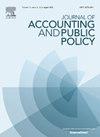Government spending and CEO equity incentives: Evidence from changes in U.S. Senate committee chairs
IF 2.2
3区 管理学
Q1 BUSINESS, FINANCE
引用次数: 0
Abstract
This study examines the impact of government spending on CEO equity incentives. Using changes in U.S. Senate committee chairs as a source of exogenous variation in state-level federal government spending, we find that firms headquartered in a state whose senator becomes a committee chair significantly reduce the convexity of their CEOs’ option-based pay, as captured by portfolio vega. This effect is more pronounced for firms with greater reliance on the government, more geographically concentrated operations, and in states with tighter local labor markets. We further find that in response to a government spending shock, firms actively adjust CEOs’ risk-taking incentives by decreasing CEO vega from annual option grants and decreasing both the number and value of CEOs’ option grants. Additionally, we document a shift in the compensation structure towards increased fixed salary and higher bonus compensation, accompanied by a shorter pay duration. Finally, we show that following the increase in government spending, firms receive more procurement contracts, experience reduced performance volatility, and those providing CEOs with less convex payoffs show lower R&D investment. Overall, our findings suggest that the positive shock to government spending due to a new committee chair reduces a firm’s desired level of risk-taking, which discourages offering risk-taking equity incentives to the CEO.
政府支出与 CEO 股权激励:来自美国参议院委员会主席变动的证据
本研究探讨了政府支出对首席执行官股权激励的影响。我们利用美国参议院委员会主席的变化作为州级联邦政府支出的外生变量来源,发现总部所在州的参议员成为委员会主席的公司会显著降低其首席执行官基于期权的薪酬的凸性,这可以通过投资组合维加(portfolio vega)来反映。这种效应对于更依赖政府、经营地域更集中以及当地劳动力市场更紧张的州的企业更为明显。我们进一步发现,在应对政府支出冲击时,企业会积极调整 CEO 的风险承担激励,减少年度期权授予带来的 CEO vega,并减少 CEO 期权授予的数量和价值。此外,我们还记录了薪酬结构的变化,即增加固定工资和提高奖金报酬,同时缩短薪酬期限。最后,我们发现,在政府支出增加后,企业获得了更多的采购合同,业绩波动性降低,为首席执行官提供的薪酬凸性降低,研发投资减少。总之,我们的研究结果表明,新任委员会主席对政府支出的正向冲击会降低企业所期望的风险承担水平,从而阻碍向首席执行官提供风险承担型股权激励。
本文章由计算机程序翻译,如有差异,请以英文原文为准。
求助全文
约1分钟内获得全文
求助全文
来源期刊

Journal of Accounting and Public Policy
Multiple-
CiteScore
4.80
自引率
2.80%
发文量
75
期刊介绍:
The Journal of Accounting and Public Policy publishes research papers focusing on the intersection between accounting and public policy. Preference is given to papers illuminating through theoretical or empirical analysis, the effects of accounting on public policy and vice-versa. Subjects treated in this journal include the interface of accounting with economics, political science, sociology, or law. The Journal includes a section entitled Accounting Letters. This section publishes short research articles that should not exceed approximately 3,000 words. The objective of this section is to facilitate the rapid dissemination of important accounting research. Accordingly, articles submitted to this section will be reviewed within fours weeks of receipt, revisions will be limited to one, and publication will occur within four months of acceptance.
 求助内容:
求助内容: 应助结果提醒方式:
应助结果提醒方式:


